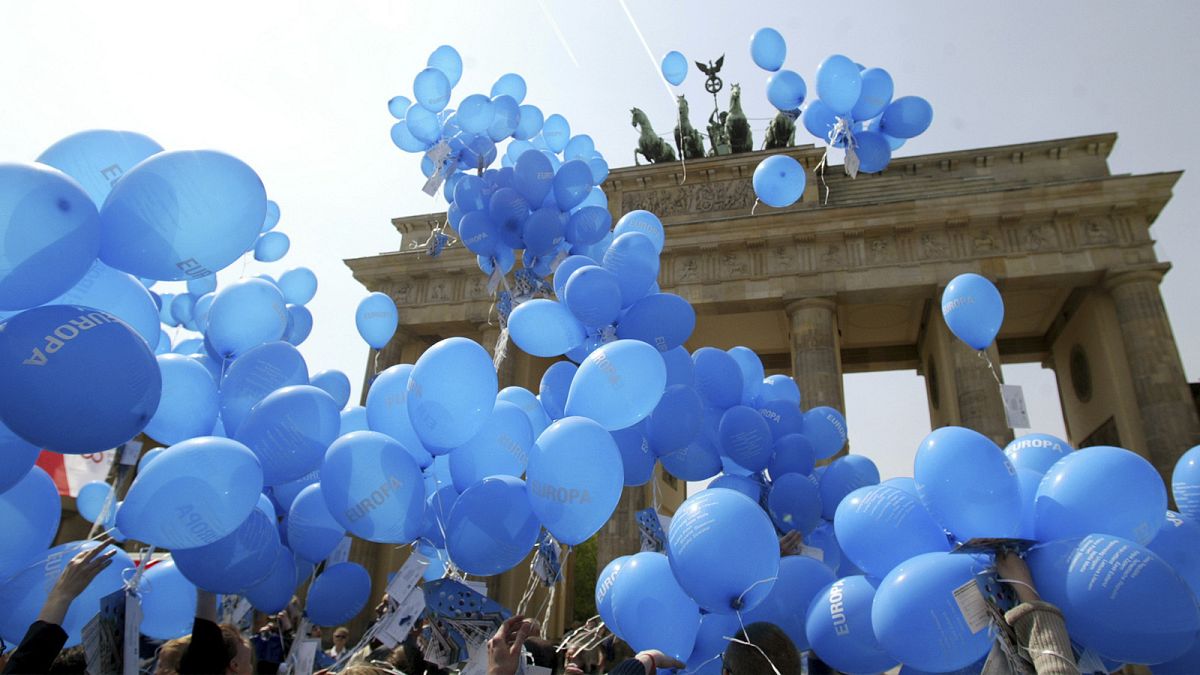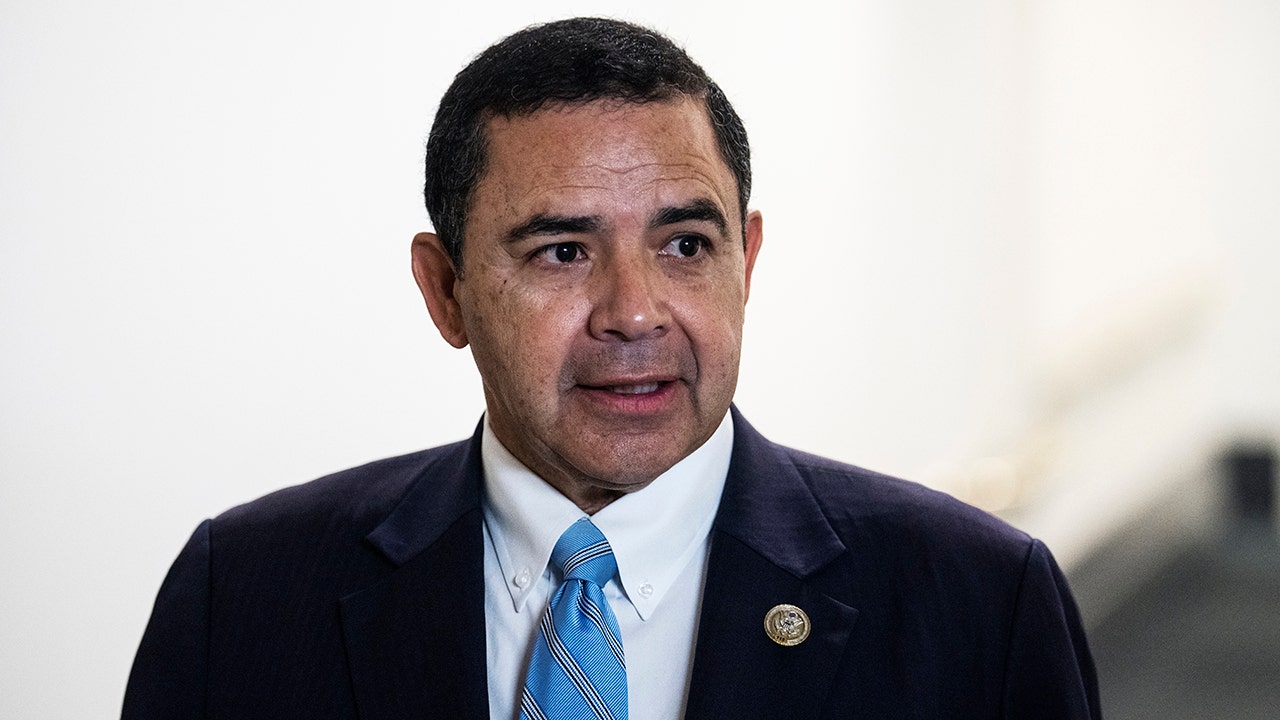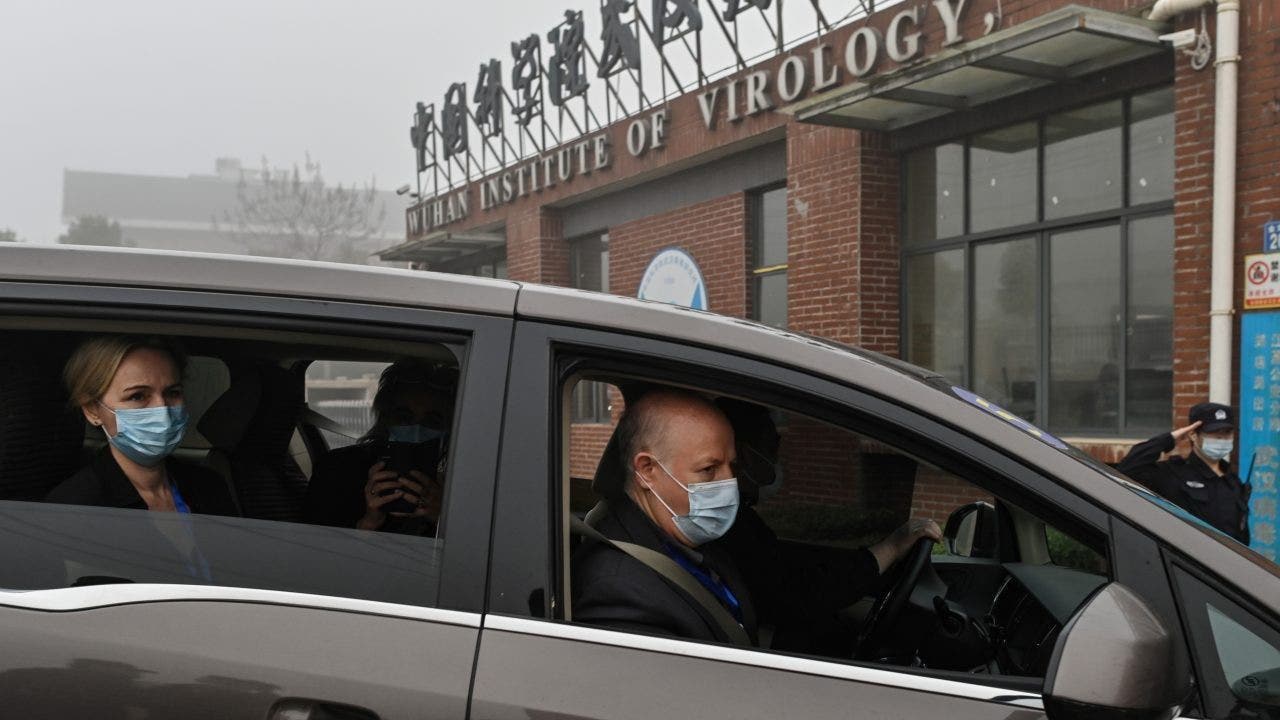World
Socialists elect Nicolas Schmit as lead candidate for EU elections
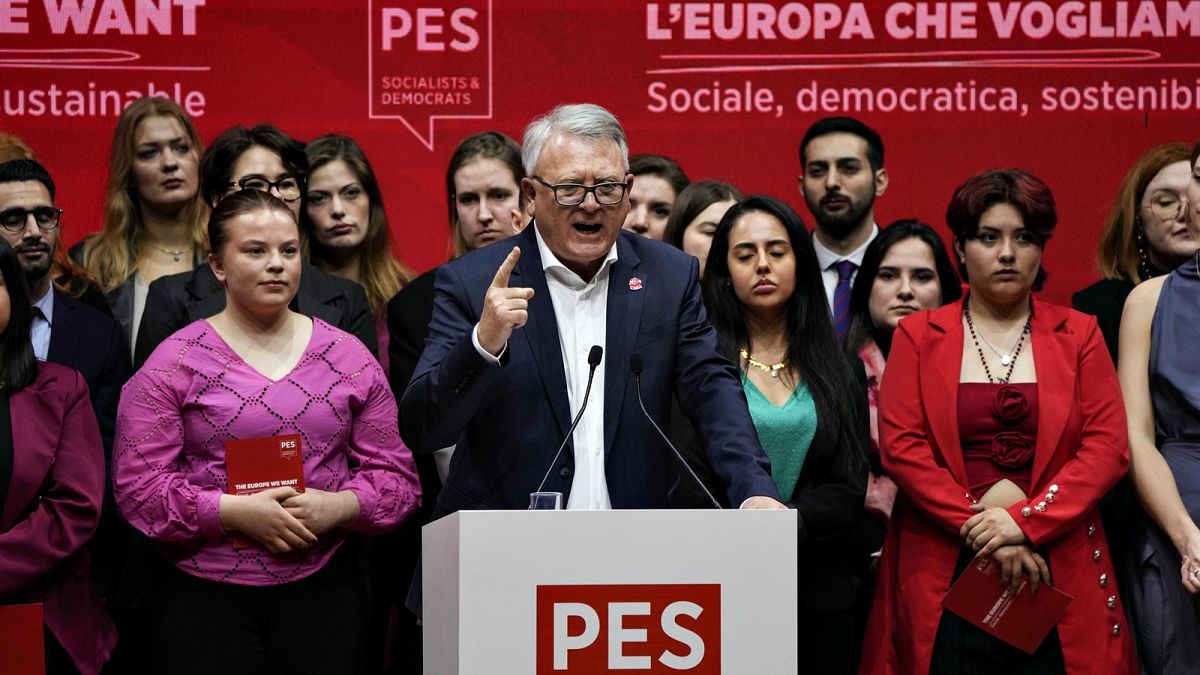
The Party of European Socialists (PES) has elected Nicolas Schmit as its lead candidate for the EU elections amid worries of a far-right surge.
Schmit, the current European Commissioner for jobs and social rights, received the mandate by acclamation on Saturday afternoon at the end of the party’s congress in Rome. The 70-year-old politician from Luxembourg led the internal race uncontested, as he was the only name put forward.
“We will not allow that Europe will take the path of austerity and social repression as it did during the financial crisis. This is the main argument, this why we want to win these elections, together, in all 27 member states,” Schmit told the audience at La Nuvola, on the outskirts of Rome, as he took the stage surrounded by young activists.
“I want voters to know that social democrats will keep fighting for all citizens and will respect their commitments and promises.”
As a result, Schmit will face off against his boss, Ursula von der Leyen, the lead candidate of the centre-right European People’s Party (EPP).
Both are part of the so-called Spitzenkandidaten system, under which the parties that take part in the elections to the European Parliament are supposed to select a top aspirant to preside the European Commission, the bloc’s most powerful and influential institution. Some groups follow the template, while others choose to ignore it.
The upcoming race, however, will be deeply uneven: Ursula von der Leyen is the indisputable frontrunner thanks to the strong reputation she has built throughout her first mandate at the Commission’s held, from which she spearheaded transformational policies to cope with climate change, the COVID-19 pandemic, Russia’s invasion of Ukraine, the energy crisis and China’s assertive behaviour.
Schmit, for his part, has kept a low profile since his arrival in Brussels in 2019, when von der Leyen assigned him the portfolio of jobs and social rights. Among his most notable projects were the launch of a €100-billion programme for short-time work schemes during the coronavirus lockdowns and a directive to ensure minimum wages are set at “adequate levels.” His proposal to improve the conditions of platform workers, those who service apps like Uber, Deliveroo and Glovo, is currently stuck in negotiations among member states and is close to plunging into limbo.
Schmit’s cabinet is one of the teams overseeing the freezing of EU funds for Hungary over persistent rule-of-law deficiencies. The Commissioner faced the ire of the Parliament after the executive released €10.2 billion in cohesion funds for Budapest, despite the antagonistic attitude of Viktor Orbán, and pleas by civil society. As of today, Hungary is still denied access to roughly €21 billion in cohesion and recovery funds.
Speaking before the PES top ranks, including Germany’s Olaf Scholz, Spain’s Pedro Sánchez, Portugal’s António Costa and Denmark’s Mette Frederiksen, the anointed candidate attempted to build his power base and vowed to defend the party’s core values and priorities: labour rights, gender equality, climate action and social justice.
“We are the movement that fights against precariousness, especially the lives and jobs of young people,” he said. “We will fight for the Green Deal with a red heart.”
Still, Schmit has virtually no chance of taking over the Commission. The Socialists and Democrats (S&D), the group in the European Parliament that encompasses PES members, is projected to finish second at the June elections. The latest estimate by Europe Elects, a poll aggregator, shows a considerable distance between the S&D (from 154 seats in 2019 to 140 in 2024) and the EPP (from 182 to 180).
Asked about the recognisability gap between himself and von der Leyen, Schmit said he had a “lot of esteem” for the president but insisted “we’re both candidates.”
“We will see,” he said. “The campaign will start and then I invite everyone to judge.”
‘The very soul of Europe is at risk’
Even more worrying for socialists, the forecasts also predict a strong rise of hard-right and far-right parties, which would tilt the hemicycle decisively towards conservative ideas and away from the progressive causes that socialists favour.
During von der Leyen’s first mandate, the grand coalition between EPP, S&D and the liberals from Renew Europe proved instrumental to advance far-reaching, ambitious proposals to speed up the transition to climate neutrality, rein in the excesses in the digital world, reform the bloc’s migration and asylum policy, ensure continued financial support for Ukraine, ramp up domestic production of cutting-edge technology, and decrease dependencies on unreliable suppliers, like Russia and China.
But in the past year, the grand coalition began to wobble and shake, as the EPP adopted a more confrontational attitude against the Green Deal, one of von der Leyen’s flagship initiatives, claiming the multiple pieces of legislation approved to slash the bloc’s greenhouse gas emission have created excessive red tape for the private sector, made it harder to invest and risked the loss of competitiveness.
The fierce battle over the Nature Restoration Law, a regulation to gradually rehabilitate the EU’s degraded ecosystems, laid bare the simmering tension between conservatives and socialists, with bitter recriminations and finger-pointing. Although the EPP eventually lost that fight, it enabled the group to re-position itself as a “pro-business” and, particularly, a “pro-farmers party,” a stance that the recent protests have only reinforced.
Von der Leyen’s withdrawal of a contentious law to halve the use of chemical pesticides, an important source of nitrogen emissions, was warmly celebrated by EPP lawmakers last month. The move marked the first major defeat under the Green Deal.
In response to this ideological shift, socialists have ratcheted up their rhetoric, warning the EPP is moving away from the mainstream centre and normalising talking points of the extreme right for purely electoral purposes. The alliances struck between mainstream conservatives and hard-right formations in countries like Italy, Sweden and Finland are evidence of this increasingly blurred line, socialist leaders said at Rome.
In his speech, Schmit made it clear his political family will not cooperate with Identity and Democracy (ID) or the European Conservatives and Reformists (ECR), the two most Eurosceptic groups in the European Parliament. The candidate then asked the EPP and the liberals to “be coherent with yourself” and “stay faithful to your own history, to your European commitment” before striking any new alliances.
“We will fight those propagating hate and division in our societies, those who fuel fears and prepare the return of nationalism,” Schmit said. “The normalisation of the extreme right, as we have seen it in the Netherlands, is dangerous and irresponsible.”
A similar message was echoed by Spanish Prime Minister Pedro Sánchez, who spoke of “ghosts of the past” that are creeping over the European institutions and longing for a time that “never existed.”
“The far right is growing all over Europe, in many places supported by conventional right that is imitating its arguments and populist techniques,” Sánchez told the congress.
“The very soul of Europe is at risk. And once again, it’s up to us, the social democrats, to defeat that threat and ensure that history continues to advance in the right direction.”
Despite the difficult prospects ahead, socialists joined forces to reclaim their legacy, arguing the main policy responses provided to the most recent crises, including the €750-billion recovery fund and the joint procurement of coronavirus vaccines, had been inspired by social democracy and therefore justified the validity of their ideology.
“These elections are crucial for the future of Europe. It is up to us to provide progressive and fair solutions to the main challenges threatening our societies and our people,” said Danish Prime Minister Mette Frederiksen, referring to migrant smuggling, social dumping, corporate tax evasion and children poverty.
“Our next step is to demonstrate how our social democratic goals of social justice, economic (equality), green ambition and security go hand in hand.”
The elections to the European Parliament will be held between 6 and 9 June. About 350 million eligible voters will be called to cast their ballots across 27 member states.
In the immediate aftermath of the elections, EU leaders are expected to gather in a crucial summit to divvy up the bloc’s top jobs: president of the European Commission, president of the European Council and high representative for foreign and security policy.
With the Commission all but guaranteed to land on the EPP’s camp, socialists are aiming to secure the European Council’s presidency, currently occupied by Charles Michel, a liberal politician from Belgium.
This article has been updated with more information about the PES Congress.

World
Night Court Renewed for Season 3

ad
World
Colombia cuts diplomatic relations with Israel, but its military relies on Israeli technology
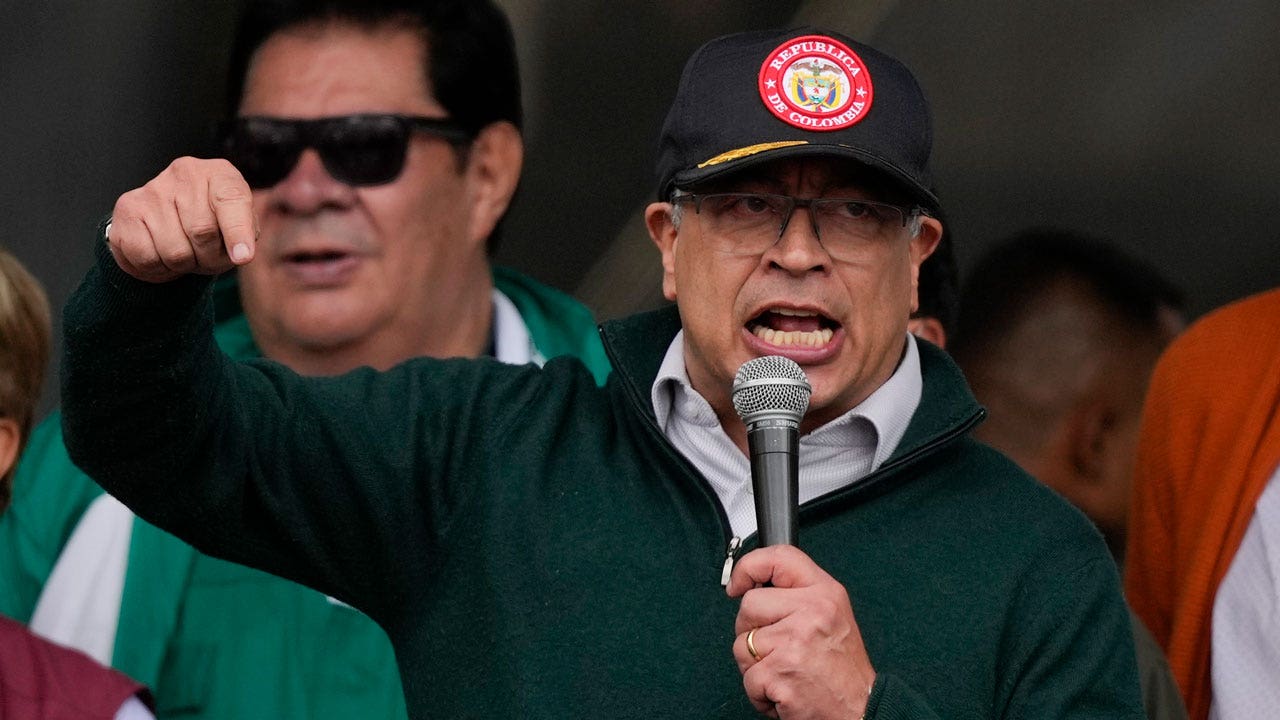
Colombia has become the latest Latin American country to announce that it will break diplomatic relations with Israel over its military campaign in Gaza, but the repercussions for the South American nation could be broader than for other countries because of longstanding bilateral agreements over security matters.
Colombian President Gustavo Petro on Wednesday described Israel’s actions in Gaza as “genocide,” and announced his government would end diplomatic relations with Israel effective Thursday. But he didn’t address how his decision could affect Colombia’s military, which uses Israeli-built warplanes and machine guns to fight drug cartels and rebel groups, and a free trade agreement between both countries that went into effect in 2020.
Also in the region, Bolivia and Belize have severed diplomatic relations with Israel over the Israel-Hamas war.
COLOMBIA’S PRESIDENT SAYS HUNDREDS OF THOUSANDS OF PIECES OF AMMUNITION HAVE GONE MISSING FROM MILITARY BASES
Here’s a look at Colombia’s close Israel ties and fallout:
WHY IS SECURITY COOPERATION BETWEEN COLOMBIA AND ISRAEL IMPORTANT?
Colombia and Israel have signed dozens of agreements on wide-ranging issues, including education and trade, since they established diplomatic relations in 1957. But nothing links them closer than military contracts.
Colombia’s fighter jets are all Israeli-built. The more than 20 Kfir Israeli-made fighter jets were used by its air force in numerous attacks on remote guerrilla camps that debilitated the Revolutionary Armed Forces of Colombia. The attacks helped push the rebel group into peace talks that resulted in its disarmament in 2016.
Colombian President Gustavo Petro speaks at the International Workers’ Day march in Bogota, Colombia, on May 1, 2024. Petro on Wednesday announced his government would end diplomatic relations with Israel. (AP Photo/Fernando Vergara)
But the fleet, purchased in the late 1980s, is aging and requires maintenance, which can only be carried out by an Israeli firm. Manufacturers in France, Sweden and the United States have approached Colombia’s government with replacement options, but the spending priorities of Petro’s administration are elsewhere.
Colombia’s military also uses Galil rifles, which were designed in Israel and for which Colombia acquired the rights to manufacture and sell. Israel also assists the South American country with its cybersecurity needs.
WILL PETRO’S ANNOUNCEMENT AFFECT COLOMBIA’S MILITARY-RELATED CONTRACTS WITH ISRAEL?
It remains unclear.
Colombia’s Foreign Ministry said Thursday in a statement that “all communications related to this announcement will be made through established official channels and will not be public.” The ministry didn’t immediately respond to a request for comment from The Associated Press, while the Israeli Embassy in Bogota declined to address the issue.
However, a day before Petro announced his decision, Colombian Defense Minister Iván Velásquez told lawmakers that no new contracts will be signed with Israel, though existing ones will be fulfilled, including those for maintenance for the Kfir fighters and one for missile systems.
Velásquez said the government has established a “transition” committee that would seek to “diversify” suppliers to avoid depending on Israel. He added that one of the possibilities under consideration is the development of a rifle by the Colombian military industry to replace the Galil.
Security cooperation has been at the center of tensions between the two countries. Israel said in October that it would halt security exports to Colombia after Petro refused to condemn Hamas’ Oct. 7 attack on southern Israel that triggered the war and compared Israel’s actions in Gaza to those of Nazi Germany. In February, Petro announced the suspension of arms purchases from Israel.
For retired Gen. Guillermo León, former commander of the Colombian air force, the country’s military capabilities will be affected if Petro’s administration breaks its contract obligations or even if it complies with them but refuses to sign new ones.
“At the end of the year, maintenance and spare parts run out, and from then on, the fleet would rapidly enter a condition where we would no longer have the means to sustain it,” he told the AP. “This year, three aircraft were withdrawn from service due to compliance with their useful life cycle.”
WHAT IS THE TRADE RELATIONSHIP BETWEEN THE TWO COUNTRIES?
A free trade agreement between Colombia and Israel went into effect in August 2020. Israel now buys 1% of Colombia’s total exports, which include coal, coffee and flowers.
According to Colombia’s Ministry of Commerce, exports to Israel last year totaled $499 million, which represents a drop of 53% from 2022.
Colombia’s imports from Israel include electrical equipment, plastics and fertilizers.
Neither government has explained whether the diplomatic feud will affect the trade agreement.
World
Meloni plans to rally Europe's centre-right in elections pledge

In the run-up to the European elections in June, Euronews takes a closer look at the Brothers of Italy party leader and the country’s prime minister’s speech in Pescara.
The Brothers of Italy’s conference in Pescara was more than a party gathering to launch Meloni’s electoral campaign.
The event marks a key moment in the run-up to the European elections in June, with the Italian prime minister’s address last Sunday providing crucial insight into her conservative leadership in Europe and her EU goals.
At the event, she announced that voters should use just her first name on their ballots. “Call me Giorgia,” she said.
The move is legal, and while many, including her rivals, have criticised her decision, it aligns with her image as a leader with working-class roots who took her first step into politics in Rome’s Garbatella district.
In both her role as Italy’s PM and president of the ECR group, Meloni outlined her vision for Europe.
Notably, she spoke of Brothers of Italy’s increased support over the years since the last European elections in 2019, while commenting on her ambitions to extend what her party has achieved in Italy to the rest of Europe.
“We want to do in Europe what we did in Italy … create a majority that brings together the centre-right forces and send the left into opposition,” Meloni said in Pescara in what has since been highlighted as a key statement.
Alliances based on issues, not ideals
A closer look at Meloni’s speech can help better understand what she has in mind. As ECR Co-Chairman Nicola Procaccini told Euronews, “Meloni refers to a spectrum of positions which sees both the ECR and the EPP as the two main axes when she talks about the creation of a majority that brings together centre-right forces.”
“Then, some delegations from ID in the right-wing camp,” adds Procaccini, “along with others from Renew Europe … will make up the total number that is needed to reach the majority to vote in favour of some measures.”
According to Procaccini, it is crucial to understand that the idea of “majority” within the new 720 seats-strong European Parliament is not fixed and that finding common ground with other political forces remains a possibility.
“Majorities or minorities form themselves based on the single vote. I do believe that the balance within the next European Parliament will shift to the right,” Procaccini said, adding that the EPP and a large part of Renew Europe are already voting alongside ECR, PiS or Viktor Orban’s Fidesz.
“It’s already happening today,” Procaccini continued, “not because there’s a deal in place, but based on the issues we are voting on.”
And as for sending the left into opposition, “it’s about giving the EPP the possibility to break the bond it has built with the socialists and the greens,” Brothers of Italy MP Sara Kelany told Euronews.
-

 News1 week ago
News1 week agoLarry Webb’s deathbed confession solves 2000 cold case murder of Susan and Natasha Carter, 10, whose remains were found hours after he died
-

 News1 week ago
News1 week agoFirst cargo ship passes through new channel since Baltimore bridge collapse
-

 World1 week ago
World1 week agoHaiti Prime Minister Ariel Henry resigns, transitional council takes power
-

 World1 week ago
World1 week agoSpanish PM Pedro Sanchez suspends public duties to 'reflect'
-

 World1 week ago
World1 week agoUS secretly sent long-range ATACMS weapons to Ukraine
-

 Movie Reviews1 week ago
Movie Reviews1 week agoHumane (2024) – Movie Review
-

 News1 week ago
News1 week agoAmerican Airlines passenger alleges discrimination over use of first-class restroom
-

 Education1 week ago
Education1 week agoVideo: Johnson Condemns Pro-Palestinian Protests at Columbia University



